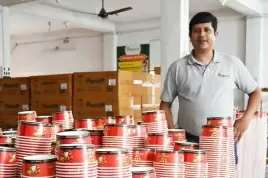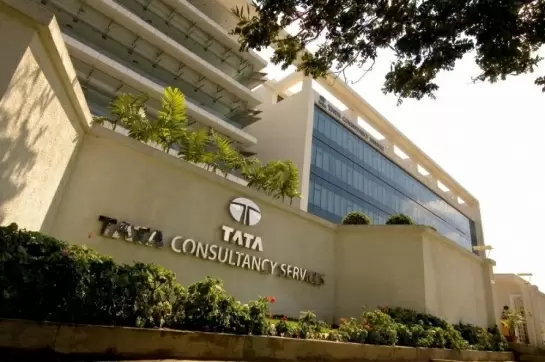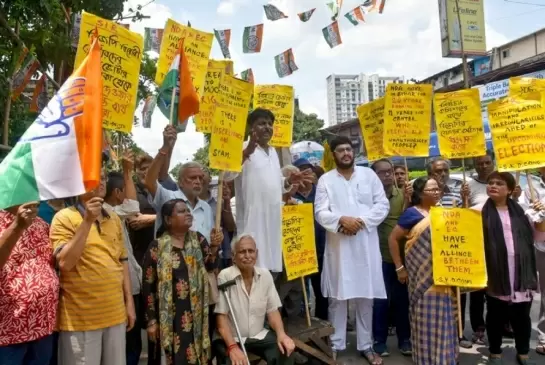Good-Hearted Farmer Upendra Kumar Pradhan’s Inspiring Rs. 17 Lakh Turnover Guava and Mango Farm
Niroj Ranjan Misra
| Cuttack
25-January-2025
Vol 16 | Issue 4
Upendra Kumar Pradhan, a farmer from Ratanapali village in Odisha’s Deoghar district, has turned his 5-acre guava and mango farm into a thriving business with an annual turnover of nearly Rs. 17 lakh.
Customers from neighbouring states such as Jharkhand and Chhattisgarh flock to buy his guavas, while locals eagerly purchase his mangoes.
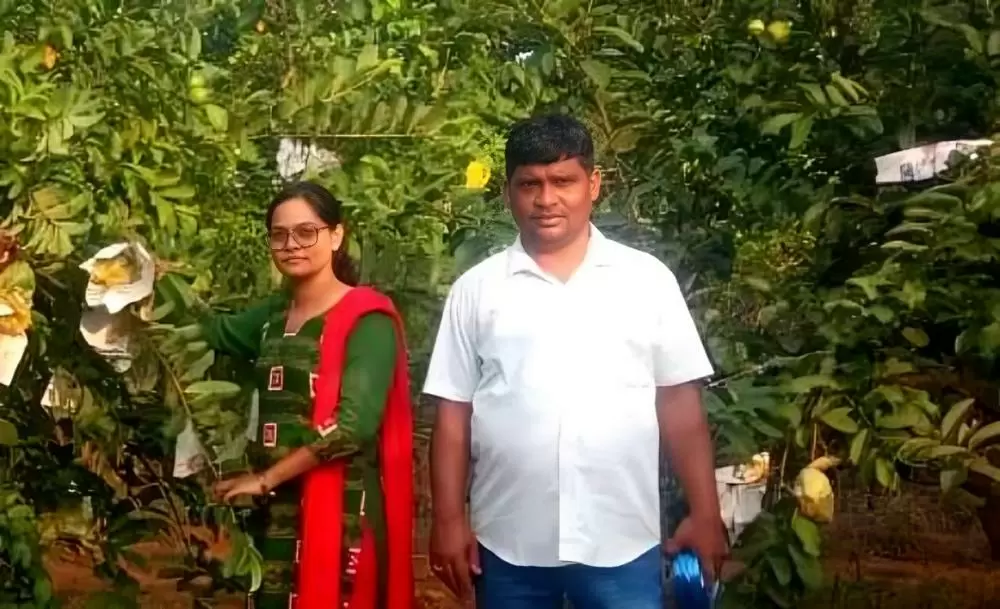
| Upendra Kumar Pradhan began with just 250 guava saplings in 2017 (Photo: Special Arrangement) |
Born into a farming family in Ratanapali, Upendra faced numerous hardships after losing his elder brothers in quick succession, one in 2004 and the other in 2007.
Both suffered from ailments and his father, Himadri Pradhan, had to mortgage two acres of paddy land for Rs 25,000 to cover the medical expenses for his sons. Financial difficulties forced Upendra to discontinue his Plus-II studies at Barkote College.
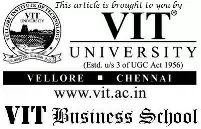
In 2017, his childhood friend Tikeswar Pradhan, an army man, encouraged him to try guava and mango farming, sharing success stories of fruit farmers he had encountered across the country.
Upendra took the risk, and it proved successful. He eventually repaid Rs. 25,000 loan amount and reclaimed the mortgaged land.
“In 2017, I purchased 250 guava saplings of VNR Bihi variety from Raipur of Chhattisgarh at Rs. 221 each that included transportation cost. I also bought 130 mango saplings of ‘Lengda’, ‘Dasahari’, ‘Hemsagar’ and ‘Amrapali’ varieties at Rs. 100 each from a private nursery in village Kalla, about 35 kilometers from Ratanpali,” said Upendra.
Upendra invested nearly Rs. 3 lakh - saved gradually from the sale of paddy cultivated on about 15 acres of land - to start growing guavas and mangoes on 1.2 acres. The guava plants began yielding fruit within six months, which he initially sold in local markets at Rs. 30-35 per kilogram.
This brought him an annual turnover of around Rs. 2-2.5 lakh in two phases - one from November to February and the other from April to June. His mango trees, however, only started bearing fruit in 2020.
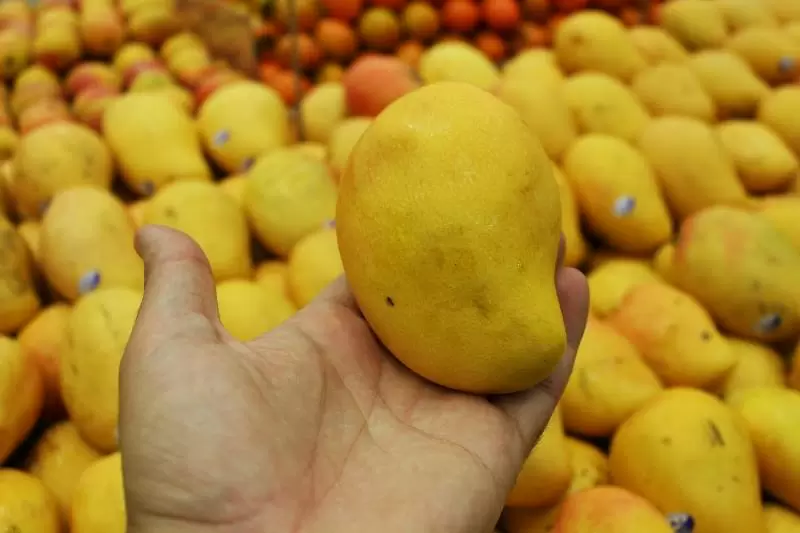
| Upendra has planted two Miyazaki mango saplings that can fetch Rs 2.5-3 lakh per kg in the international market (Photo for representational purpose only) |
Mangoes of the ‘Lengda’ and ‘Dasahari’ varieties sold for around Rs. 25 per kilogram, while ‘Amrapali’ and ‘Himsagar’ fetched about Rs. 15 per kilogram in local markets. The total annual earnings from mangoes exceeded Rs. 45,000 at that time, whereas the guava business generated an annual turnover of about Rs. 3.5 lakh in 2020.
Upendra shared, “Now the annual turnover from my guava trading is Rs. 12, while mango trading earns between Rs. 1.5-2 lakh. Additionally, I sell guava and mango saplings at Rs. 100 each, which brings in nearly Rs. 1.5 lakh annually.”
His wife, Kuni Pradhan, a former Sarpanch of Kelda Panchayat, stands by his side in farming while also managing household responsibilities. Kuni, a mother of two children (a son and a daughter), oversees the entire farm's operations, while Upendra, with the help of his four permanent labourer couples, focuses on farming and marketing.
Kuni and Upendra practise organic farming by using bovine urine, cow dung, goat droppings, vermicompost, Sorisha Pidia (mustard cake), and Rasi Pidia (sesame cake). They have two pits to prepare vermin compost.
They purchase ‘Sorisha Pidia’ at Rs. 40 per kilogram, while Rasi Pidia costs around Rs 80-90 per kilogram. But they do not have to pay for collecting bovine urine, cow dung, goat droppings, as these are readily available from cattle and goat farms in their village and nearby areas.
“As a result of our organic farming, some guavas weigh up to 1,430 grams each, while two mango varieties, particularly of the ‘Lengda’ variety, weigh over one kilogram.” Kuni said. She said one of the main reasons for their success was the proper management and maintenance of their farm, for which they spend around Rs. 35 lakh every year.
Upendra, however, acknowledged that organic farming accounts for 80 percent of his plant management. On the advice of scientists from Krishi Vigyan Kendra (KVK) in Deoghar, he uses chemical fertilisers, which make up the remaining 20 percent of his farming practices.
“Last year, when the pest ‘Phala Masi’ nearly destroyed 30 to 40 percent of his yield, he sought our help,” said Dr. Khirod Biswal, KVK scientist (plant pathology). “We provided him with fruit fly traps and trained him on their management, which helped him tackle the issue. Additionally, we recommended the use of basal fertilisers like Di-ammonium Phosphate (DAP) and potash to complement the benefits of organic farming.”
Upendra now aims to increase the cumulative annual turnover of his guava trading to about Rs. 18 lakh and that of mango trading to Rs. 4 lakh. He has already taken steps to achieve this target. He has planted 100 drought-resistant seven guava Thaisaplings, which require low maintenance. He purchased them at Rs. 150 each from Angul district after browsing the Internet.
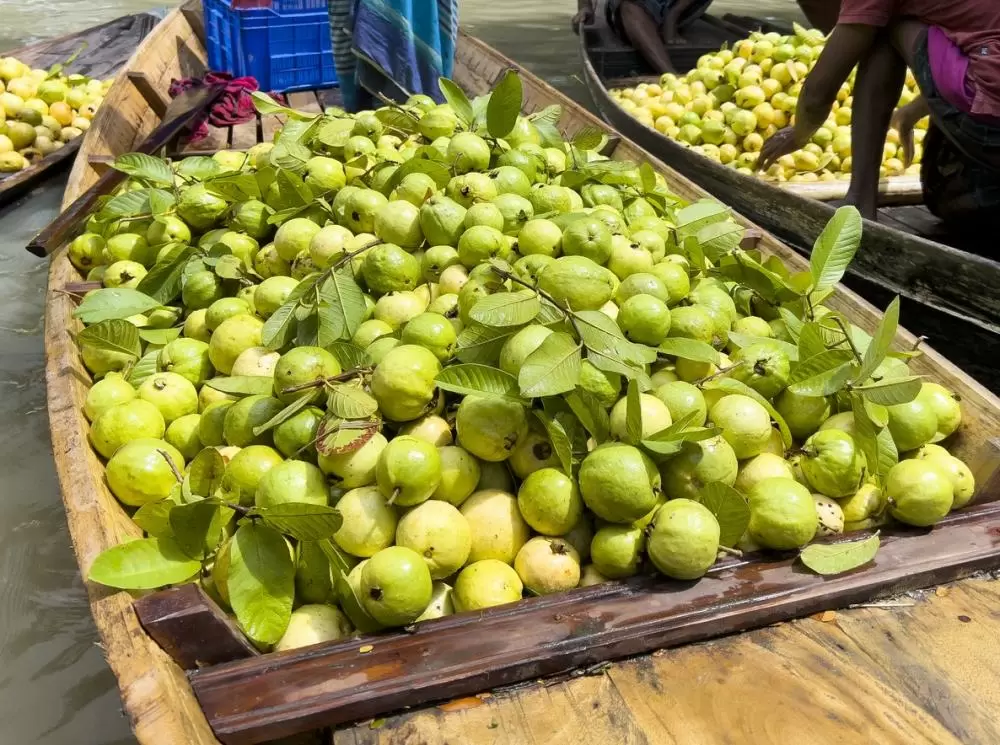
| Upendra has planted drought resistant guava varieties that require low maintenance (Photo for representational purpose only: - iStock.com/ MD MARUF HASSAN) |
Similarly, he planted two Miyazaki mango saplings, which are said to have an international market price of Rs. 2.5-3 lakh per kilogram. He bought each sapling at a concessional price of Rs. 150 from a friend in Teleibani, about 60 kilometres from his village, Ratanpali.
Additionally, he planted two saplings each of the ‘Baramasi,’ ‘Akhu Rasa,’ and ‘Baiganapali’ mango varieties. While a ‘Baramasi’ sapling cost him Rs. 500 in the steel city of Rourkela in Sundargarh district, the price of each ‘Akhu Rasa’ and ‘Baiganapali’ sapling was Rs. 200 in Deoghar district headquarters.
Upendra shared, “I always leave the fruits of 40 trees along the border of my farm for free public and animal consumption. Additionally, nearly 15 percent of the fruits are distributed freely among my near and dear ones after my trees bear their first fruit each year.”
He expressed his gratitude towards his workers, saying, “I owe much to my four permanent labourer couples. Without their hard work and loyalty, I could not have achieved success after a long spell of struggle.”
Saroj Sabar, one of Upendra’s permanent labourers for the past seven years, speaks highly of him. “He not only pays Rs. 6,000 to each of his four permanent labourer couples as a monthly salary but also provides 20 kilograms of rice every month. Moreover, he has given us houses on the farm premises. Apart from this, he willingly takes care of our emergency expenses,” said Saroj.







